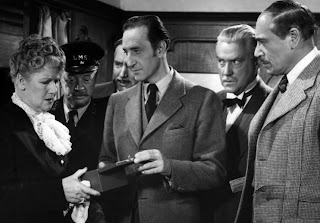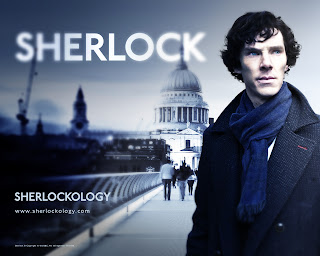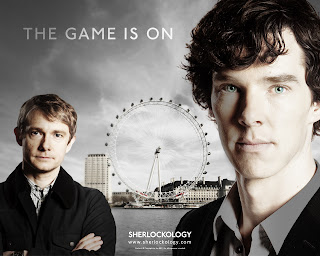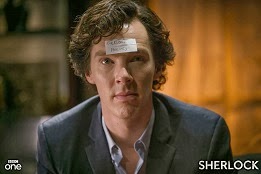Dear Readers, please join me in welcoming Chris Allen, author of Intrepid series. Chris is a fan of Arthur Conan Doyle's stories and has contributed this guest post about the same. Over to you, Chris:
 |
| Chris Allen |
One of the great pleasures in my life to date has been in watching directors, producers and screenwriters re-interpret the great writing of Sir Arthur Conan Doyle as new productions are brought to the big and small screens. I literally count the days until the next Robert Downey/Jude Law collaboration hits the box office, and I always attempt to create a quiet environment at home when it's time to take in the BBC Sherlock series and the new US take on Holmes, Elementary. I collect the DVDs (special edition if possible) and watch them at my leisure, all the while re-reading at least one of Conan Doyle’s stories each week. Such is my obsession enjoyment of these stories and the literary inspiration I derive from them. It is indeed a pleasure to see them out again in the mainstream media for our general consumption.
One of the things I like to reflect upon when I’m viewing one or other of the latest iterations is the variety of ways in which the main characters, Sherlock Holmes and John Watson have been presented to us over the years.
Before the recent adaptations, many people only knew of Holmes through the old black & white movies of the late 30's/early 40's, featuring Basil Rathbone. Fans of those movies will kill me for saying this, but I feel they were clichés. Rathbone's Holmes was too perfect, the ultimate version, I suppose, rather than the complex, flawed, sometimes opiated, routinely depressed yet highly intelligent character we see on Conan Doyle’s pages.
 |
| Basil Rathbone as Sherlock Holmes |
That said, my greatest bugbear with the older versions was the reduction of Dr. John Watson, as portrayed by Nigel Bruce, to little more than a bumbling oafish sidekick. I appreciate that the 'straight man & comic relief' pairing probably reflected the times, especially considering audience familiarity with the Crosby & Hope, Abbott & Costello, Martin & Lewis partnerships. In the books however, John Watson is nothing like that at all. Conan Doyle had put so much of himself into Watson’s history and character that you can’t help but admire them – they were incredible men, one real, the other fictional but steeped in reality. Note: In fairness to Rathbone & Bruce, both men saw action during World War 1. Rathbone was awarded the Military Cross for bravery and Bruce was shot and severely wounded.
Probably my favourite element of the original stories was that they were all written from Watson’s perspective, which was very effectively captured - in a contemporary sense - in BBC's Sherlock via Watson's blog, something that viewers of the US Elementary series may not realise.
Click on the link below to buy the book:
Holmes is so reliant on his partnership with Watson. In fact, in the books Holmes often states that he is so much better off when he has his trusted friend and ally at his side. If it wasn’t Holmes saving the day with some well-paced judo moves, then it would be Watson with his revolver. I love the duo. They are much more like Bodie and Doyle from The Professionals than Batman and Robin, if you know what I mean: a much more equal pairing than the old movies ever gave them credit for.
.jpg) |
| Robert Downey Jr and Jude Law in Sherlock Holmes (2009) |
Although the stories have been done many times over, the real resurgence of interest in Sherlock Holmes in recent years has been due to, I think, directors and producers of my age who loved the books throughout their lives and imagined them as similarly vividly as I always have. I really got into the Sherlock Holmes (2009) movie with Robert Downey Jnr. and Jude Law. While they gave the camaraderie between the two characters a great treatment, they also gave the story more of a modern edge, particularly in terms of the banter between them. It’s perhaps not as gentlemanly, but still in the same vein as Conan Doyle’s original. Then the movie sequel to the 2009 hit became more slapstick again, and took it a bit far from Conan Doyle’s books for my personal preference, but I still enjoyed the interplay between Downey Jnr and Law across both films.
Since then, obviously, we've had two equally interesting but vastly different treatments of Sherlock Holmes: BBC’s dark but modern-day Sherlock (2010) and CBS’s quirky and equally contemporary Elementary (2012). BBC’s Sherlock, with Benedict Cumberbatch (Holmes) and Martin Freeman (Watson) came pretty close to the originals of Holmes and Watson and stayed true to the stories. They established a great equal relationship between the two men.
 |
| Benedict Cumberbatch and Martin Freeman in BBC Sherlock |
Next to Sherlock, I’m equally enamoured with CBS’s Elementary, featuring Johnny Lee Miller as Holmes and Lucy Liu as Joan Watson. It’s a great take on the complexity and eccentricity of Holmes counterbalanced by the thorough, no-nonsense medical professionalism that is Watson. It’s such a thought-provoking angle with a man and a woman, and it really breathed new life into this incredibly enduring story.
In terms of my own writing, I also enjoyed the camaraderie inherent to military life, just as Conan Doyle obviously did. I've tried to replicate that in my stories, with regard to the banter and conversational exchanges between my protagonist Alex Morgan and his colleagues, the way they are and the way they interact with each other. It reflects my view that no one is an island; we are all reliant on each other in some way and there are people you must and can trust during times of adversity. I guess that’s what I love most in Conan Doyle’s stories and probably the reason I try to bring it out in my own humble offerings.
In this day and age, I don’t want to have just male agents in my thriller novels; Alex Morgan and his compadres are great, but they need some female energy in the mix. Just as we’ve seen Lucy Liu acting as Joan Watson in Elementary, I’m writing a new key character in the latest book, Avenger. She’ll be the first female Intrepid agent to be introduced to the legions of Intrepid and Alex Morgan fans currently amassing across the globe! She sure knows her stuff, but I can’t tell you her name or anything else just yet.
 |
| Jonny Lee Miller as Sherlock Holmes and Lucy Liu as Joan Watson in CBS Elementary |
I’d love to hear your thoughts on your preferred adaptation of Sherlock – or maybe you can’t beat the books? We know, for example, that our good friend B2B (Is CBS Elementary a good adaptation of Sherlock Holmes?) is a fan of Basil Rathborne and doesn’t believe that Elementary will hit cult status. Leave your comment below!
A former Paratrooper, Government Security and Counter-Terrorism expert, and - most recently - the Sheriff of New South Wales, Chris Allen's series of thriller novels feature Interpol's ultra-secret sub-directorate Intrepid and star agent Alex Morgan. His experience of the publishing revolution has been up close and personal, self-publishing before being signed to Pan Macmillan's digital imprint, Momentum Books. Defender and Hunter have become instant eBook sensations with traditional print deals and a film franchise underway.
If you enjoyed this post, please subscribe to this blog by email or RSS by clicking here.
Image Sources: CBS, BBC, Warner Bros, Wikimedia
You might also like:






.jpg)


























